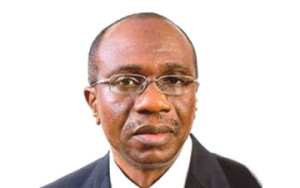Central Bank of Nigeria (CBN) Governor Godwin Emefiele yesterday mandated commercial banks to lower their risk rating for Small and Medium Enterprises (SMEs) or lose Cash Reserves Ratio (CRR) refunds.
He issued the warning in his keynote address at the seventh annual Bankers’ Committee Retreat in Lagos.
Emefiele said: “We need the support of the commercial banks to lower the risk acceptance level for SMEs. If they refuse, we will take the money they should have got through the CRR and lend them out to the SMEs. We cannot continue to give you that money only that you can go and buy treasury bills”.
The CRR is a portion of banks’ deposits kept with the CBN as reserves, at zero interest rate. The Monetary Policy Committee’s (MPC’s) decision to harmonise the CRR on public and private sector deposits at 20 per cent from 25 per cent, is expected to add over N2 trillion to banks’ available deposit and enhance ready-cash for lending.
The lenders are expected to be refunded five per cent, after the CRR cut during last month’s MPC meeting. The CRR was first harmonised by the MPC in May, as it considered that the discriminatory CRR on public and private sector deposits has not only constrained the policy space but could inspire moral hazard by private market participants.
Minister of Finance Kemi Adeosun and Lagos State Governor Akinwunmi Ambode attended the opening session.
Mrs Adeosun said the hard times that the country is in will be over is banks give the necessary support to the SMEs, which sector she said, contributes 50 per cent of the Gross Domestic Product (GDP).
She said: “Our debt-to-GDP ratio is low, and that gives us some space to try and run and deficit budget. But we need to do some fiscal house-keeping an there are some initiatives we have already rolled out. We need to borrow in order to stimulate the economy. But the significant challenge we have to do with recurrent expenditure.
“If you look at recurrent it is high, if we continue in that trajectory every penny we borrow would go to recurrent.
“So a lot of initiatives is all about how we would contain recurrent. So, we know where we are going and it is very important to inform you that we are going to borrow and you are the people we are going to get money from.
“So, I need to let you know that we would be raising money, but we want to make sure that such borrowing go into capital expenditure that would stimulate the economy. Never mind, I do believe that Nigeria can overcome its challenges.
“I am not here to paint a rosy picture, but I believe it is going to be tough and we need to take tough decisions. But I also believe we have the resilient and space to do that.”
Ambode said Lagos state would soon complete the legislative process to inaugurate its employment trust fund board of trustees.
He said the fund would allow youths and entrepreneurs, particularly in the social enterprise sector, to be supported.
Ambode said the state would start the funds with N25 billion in the next three years.
He said the entreprenuers had not accessed up to 20 per cent of the employment trust fund.
“I just want to say you know mine is like an intervention fund of which we believe strongly that the interest that we are going to charge will not be more than three per cent.”
Emefiele said the commercial banks have not played active role to support the SMEs stressing that whether the lenders choose not to co-operate with the CBN, it will forge ahead with plans to increase finance to the sector in a bid to diversify the economy from oil.
“We are contemplating a new funding for young graduate. We will create at least one million employment in 2016 through concessionary loan for our young graduates,” he said.
The job creation initiative, according to the apex bank, will be in form of support from both CBN, the Nigerian banks and development institutions in terms giving out cheap and concessionary loans to companies that are in the MSMSEs.
The CBN boss lamented that less than 50 per cent of N220 billion the Micro, Small and Medium Enterprises (MSMEs’) loan has been assessed since its creation in 2012. He disclosed that in second quarter of this year, about N40.3 billion has been disbursed to state governments, commercial banks, micro finance banks and financial cooperatives.
The governor said as a result of the drop in the commodity prices, the central bank is faced with very serious pressure on the excess reserves and the exchange rate. He said growth in the economy relied around 2.4 percent in the last quarter and if the country is lucky would improve to around 3.5 percent in 2015.
Emefiele told the chief executives of the commercial banks that there is the need to think about how to come together to protect the economy from what is happening not just in Nigeria but in the world in general.
According to him, SMEs represent 99.5 per cent of companies in Germany, employ 68 per cent of the labour force and contribute 37 per cent of corporate turnover in the country.
He regretted that Nigeria with 37 million MSMSEs did not have 99.5 per cent of companies coming from the SMEs sector.
Germany, he said, was least affected by the global financial crisis and practically carrying all the burden of Europe today because it has a strong economy that is built on the support that has been given to the MSME sector.
END


Be the first to comment